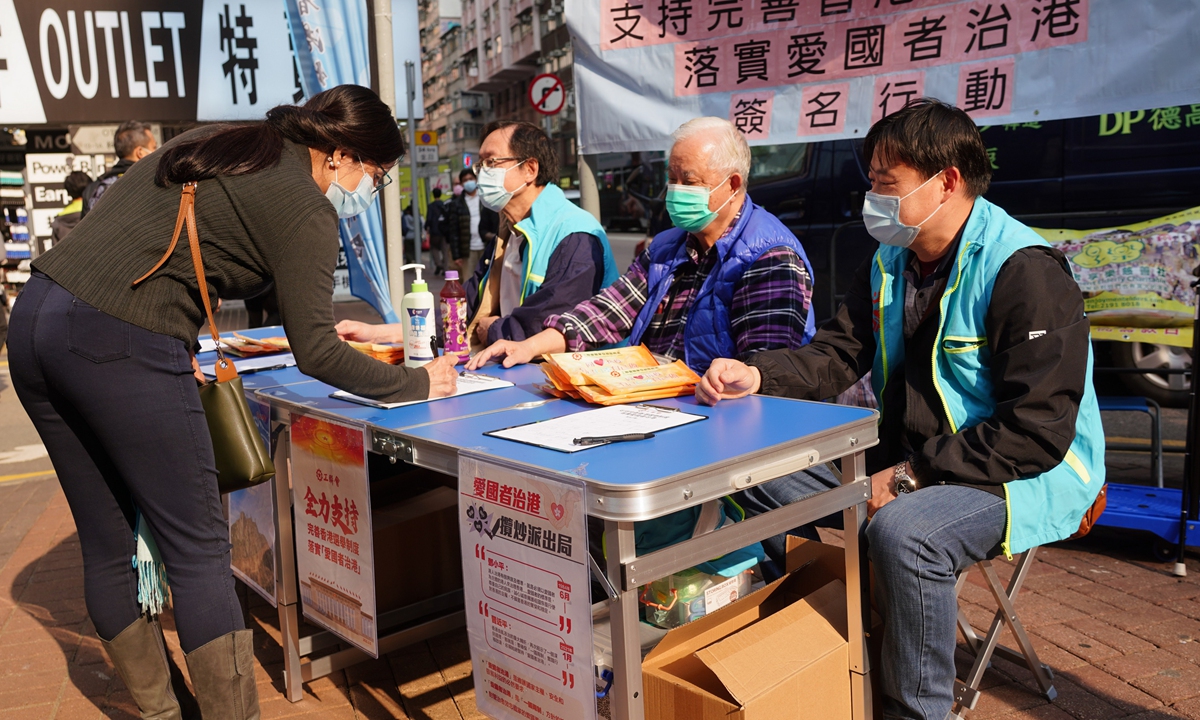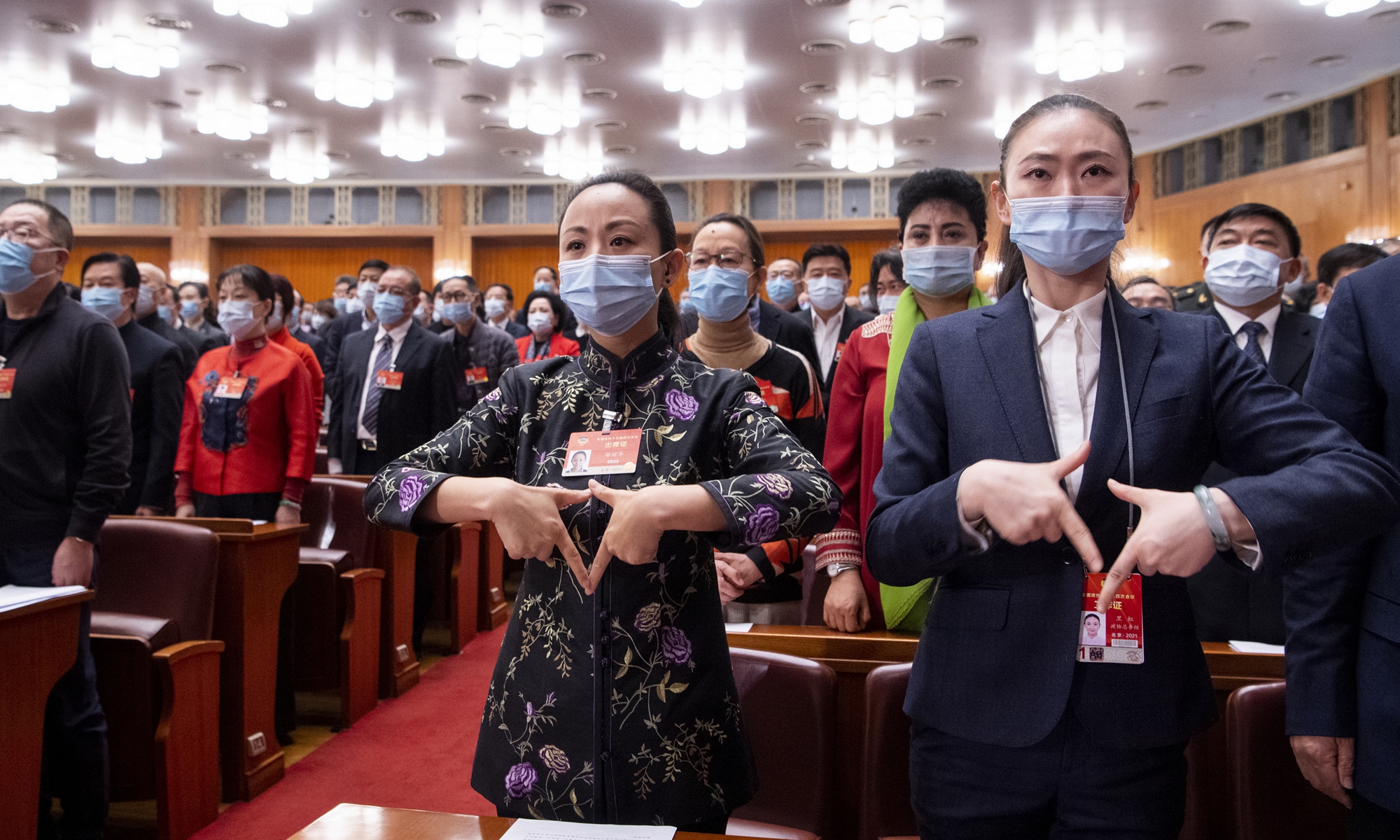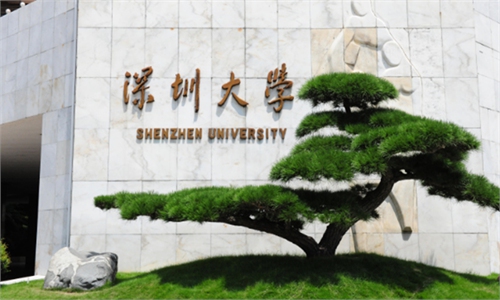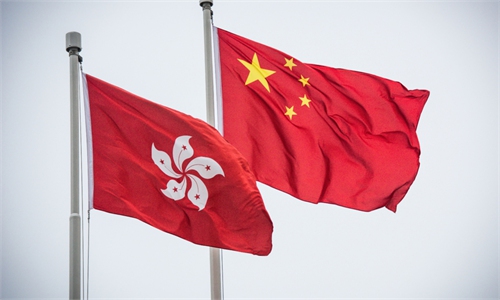
Hong Kong residents sign their names in support of improving the city's electoral system at a post set up by the Hong Kong Federation of Trade Unions, a Hong Kong local labor and political group established in 1948, on Tuesday. Photo: cnsphoto
The highly expected draft decision to overhaul Hong Kong electoral system with the aim of fixing the loopholes in local governance is scheduled to be voted on and passed on Thursday as the annual two sessions conclude. This reflects a shared consensus over the urgency and necessity about the implementation of the principle of "patriots governing Hong Kong" while setting the tone for the city's future development for the next 25 years and more.
One week after China's top legislature officially introduced on March 4 a comprehensive reform plan for Hong Kong electoral system into this year's two sessions agenda, Chinese lawmakers have gone through group discussions concerning the draft decision about improving Hong Kong electoral reform with detailed measures including enhancing the functions and roles of the Election Committee for electing Legislative Council (LegCo) lawmakers and the region's chief executive, expand the scope of candidates to make local elections more representative and set up a high-level vetting committee to ensure candidates meet the principle.
As a highlight of China's most important annual political meetings in 2021, Hong Kong electoral reform will soon be implemented following the enactment of the national security law for Hong Kong, another significant piece of lawmaking to plug the loopholes in national security in the city and helping restore stability after months of radical anti-government protests that turned into black-clad riots. Local officials, lawmakers and scholars in Hong Kong consider these two pieces of legislation as major steps to fix the problems accumulated over the years since the city returned to the motherland in 1997, clarifying long-term misunderstandings about the "one country, two systems" principle and restoring the constitutional order of the city as one of China's special administrative regions (SAR).

Tai Lihua (center), a member of the 13th National Committee of the Chinese People's Political Consultative Conference (CPPCC) and head of the China Disabled Persons' Art Troupe, and Hei Hong (right), sign language teacher and interpreter for the troupe, sign the national anthem on Wednesday when the fourth session of the 13th National Committee of the CPPCC closed at the Great Hall of the People in Beijing. Photo: VCG
'Mid-term surgery'
After listening to representatives from various aspects of Hong Kong society, the country's top legislature came up with targets, procedures and detailed measures for the upcoming electoral reform for Hong Kong. The reform plan, which has been widely welcomed by the public, aims to exclude anti-government political figures who have no basic professional integrity and have made efforts to turn places such as LegCo, district councils and the Election Committee into platforms to take over the power of authority by engaging in subversive activities. This has become a path deviating from the original intention of establishing the unique "one country, two systems" for Hong Kong, local lawmakers and policy advisors said.
"In foreign countries, a civil servant who pledges allegiance to his country will not be against it, but many ignorant politicians in Hong Kong will take offensive acts against their nation, which is a big joke," Priscilla Leung Mei-fun, a member of the Basic Law Committee, told the Global Times on Wednesday.
How did we get into this situation when some political figures in Hong Kong oppose their country, advocate secessionism, demonize the national development plan and take their compatriots as enemies? It's time to reflect on what is wrong with Hong Kong, Leung said.
"Implementing the national security law for Hong Kong and now the electoral reform is like having a mid-term surgery, as we're getting close to 25 years, while the baseline policy of 'one country, two systems' remains unchanged for 50 years. This surgery will help the city get better by carrying on the policy better," she noted.
To plug existing loopholes by screening out unqualified participants in political life in Hong Kong, a whole-process candidacy vetting commission will be established. The Election Committee will be entrusted with the new function of electing a relatively large share of LegCo members and directly participating in the nomination of all candidates for LegCo, according to the draft decision. The core of the overhaul is the change in the functions and roles of the Election Committee by combining the election of the chief executive and LegCo lawmakers through the Election Committee.
Some experts believe the changes will bring the social bases of the executive and legislative powers of the HKSAR closer, which is expected to ease the conflict and confrontation between the two powers in Hong Kong seen in the past.
To expand the scope of participation and reach a balanced representation, the number of seats on the Election Committee will increase from 1,200 to 1,500, according to some local media reports in Hong Kong. The number of seats in the LegCo will increase from 70 to 90, with a balanced distribution of seats returned by geographical constituencies, functional constituencies and the Election Committee, some reports said.
Initial intention
With Western countries closely watching the final version of the electoral overhaul in Hong Kong, Western media claimed the city is going backward on democracy, as the Basic Law includes that "the ultimate aim is the selection of the Chief Executive by universal suffrage upon nomination by a broadly representative nominating committee in accordance with democratic procedures."
Looking back to our democratic procedures in the past, for a long period, we have deviated from the right path, in contrary to the initial intention of establishing "one country, two systems" and the Basic Law, Rita Fan Hsu Lai-tai, former president of LegCo, told the Global Times on Wednesday.
"What was our goal at the beginning? It was to ensure the prosperity of the city. But following that path, we selected some lawmakers who destroyed the city's stability and prosperity," she said.
"And what is democracy? During the social turmoil in 2019, using democracy as an excuse, many radicals did not tolerate any different ideas and they attacked those who disagreed with them, and that was the path leading us to a complete meltdown, which has to be changed," Fan said.
The electoral reform will wipe out anti-China and anti-Hong Kong activists but that does not mean the pro-establishment camp could rest easy, according to observers.
"The reform will also expand the scope of representation, letting more talents join in local governance, no matter which parties they are in, but the bottom line is being a civil servant to help build Hong Kong better, not to destroy it," Leung said.




